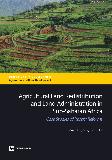Decreto Nº 182 - Reglamenta la Ley Nº 333 de 1996.
El presente Decreto reglamenta la Ley Nº 333 de 1996, en lo relativo a la destinación provisional y asignación definitiva de los bienes rurales con caracterizada vocación rural en favor del Instituto Colombiano de la Reforma Agraria (INCORA), y dicta disposiciones relacionadas con su adjudicación.






